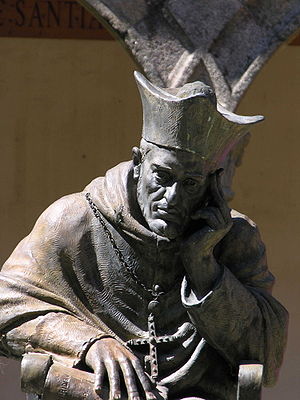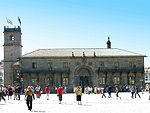
Alonso III Fonseca
Encyclopedia

Galician people
The Galicians are an ethnic group, a nationality whose historical homeland is Galicia in north-western Spain. Most Galicians are bilingual, speaking both their historic language, Galician, and Castilian Spanish.-Political and administrative divisions:...
archbishop
Archbishop
An archbishop is a bishop of higher rank, but not of higher sacramental order above that of the three orders of deacon, priest , and bishop...
and politician
Politician
A politician, political leader, or political figure is an individual who is involved in influencing public policy and decision making...
. He was archbishop of Santiago de Compostela from 1507, and archbishop of Toledo from 1523. He was a major supporter of the University of Santiago de Compostela
University of Santiago de Compostela
The Royal University of Santiago de Compostela - USC is a public university located in the city of Santiago de Compostela, Galicia, Spain. A second campus is located in Lugo, Galicia....
. He was the son of the archbishop Alonso II Fonseca and Alonso II's concubine María de Ulloa.
His older brother was Diego II de Acevedo, first Count of Andrade. They had different surnames because a younger son (i.e. Alonso III Fonseca) would take the surname of his father (“Fonseca”) and the older son would take the name of his grandmother (the mother of his father the archbishop), which was “Acevedo.”
Early life and career as Archbishop of Santiago de Compostela
As archbishop, he was forced to confront Rodrigo Osorio de Moscoso, Count of Altamira, because the count was meddling in the affairs of the Tierras de Santiago, and also put a stop to the injustices committed by the governors there, taking advantage of his close relations with the Spanish monarchySpanish monarchy
The Monarchy of Spain, constitutionally referred to as The Crown and commonly referred to as the Spanish monarchy or Hispanic Monarchy, is a constitutional institution and an historic office of Spain...
as well as the papacy. He was also involved in lawsuits against the Benedictine monks of San Martín Pinario, during a resurgence of this religious order in Galicia.
He presided over his father’s funeral in 1512, at which Gonzalo Fernández de Córdoba
Gonzalo Fernández de Córdoba
Gonzalo Fernández de Córdoba known as The Great Captain, Duke of Terranova and Santangelo, Andria, Montalto and Sessa, also known as Gonzalo de Córdoba, Italian: Gonsalvo or Consalvo Ernandes di Cordova was a Spanish general fighting in the times of the Conquest of Granada and the Italian Wars...
, known as "The Great Captain", attended, and Fernández de Córdoba symbolically offered his weapons to Saint James the Great
Saint James the Great
James, son of Zebedee was one of the Twelve Apostles of Jesus. He was a son of Zebedee and Salome, and brother of John the Apostle...
(Santiago) at the funeral.
Political career
He assumed the leadership of the Galician nobility, who wished to maintain their privileges, and was named by Charles VCharles V, Holy Roman Emperor
Charles V was ruler of the Holy Roman Empire from 1519 and, as Charles I, of the Spanish Empire from 1516 until his voluntary retirement and abdication in favor of his younger brother Ferdinand I and his son Philip II in 1556.As...
as a member of the Royal Council. The Galician nobility was not included in the Cortes (Legislature) of Santiago and the Cortes of A Coruña
A Coruña
A Coruña or La Coruña is a city and municipality of Galicia, Spain. It is the second-largest city in the autonomous community and seventeenth overall in the country...
, and Fonseca led the fight for their inclusion in these legislative bodies. Fonseca presided over an assembly at Melide, whose aims for the Kingdom of Galicia
Kingdom of Galicia
The Kingdom of Galicia was a political entity located in southwestern Europe, which at its territorial zenith occupied the entire northwest of the Iberian Peninsula. Founded by Suebic king Hermeric in the year 409, the Galician capital was established in Braga, being the first kingdom which...
included demands for legislative representation and a new board of trade
Board of Trade
The Board of Trade is a committee of the Privy Council of the United Kingdom, originating as a committee of inquiry in the 17th century and evolving gradually into a government department with a diverse range of functions...
(casa de contratación) based at A Coruña. He also served as a mediator in the War of the Germanías.
Archbishop of Toledo
In 1523, he was named Archbishop of Toledo, and in this position, served as a patron to scholars, artists, and humanists. He baptized Philip II of SpainPhilip II of Spain
Philip II was King of Spain, Portugal, Naples, Sicily, and, while married to Mary I, King of England and Ireland. He was lord of the Seventeen Provinces from 1556 until 1581, holding various titles for the individual territories such as duke or count....
in May 1527. His main place of residence was at Alcalá de Henares
Alcalá de Henares
Alcalá de Henares , meaning Citadel on the river Henares, is a Spanish city, whose historical centre is one of UNESCO's World Heritage Sites, and one of the first bishoprics founded in Spain...
, where he died on February 4, 1534. He was buried at Salamanca
Salamanca
Salamanca is a city in western Spain, in the community of Castile and León. Because it is known for its beautiful buildings and urban environment, the Old City was declared a UNESCO World Heritage Site in 1988. It is the most important university city in Spain and is known for its contributions to...
.
He had a son, the result of an affair with the noblewoman Juana de Pimentel. Fonseca's son later served the Spanish king and inherited property in Galicia.
Legacy

Polymath
A polymath is a person whose expertise spans a significant number of different subject areas. In less formal terms, a polymath may simply be someone who is very knowledgeable...
and patron of numerous artists of the time, who was in touch with important thinkers such as Erasmus of Rotterdam
Rotterdam
Rotterdam is the second-largest city in the Netherlands and one of the largest ports in the world. Starting as a dam on the Rotte river, Rotterdam has grown into a major international commercial centre...
. Around 1507 the old Pilgrim's Hospital in Santiago de Compostela was purchased with the aim of transforming it into a university college. The Santiago Alfeo College, today known as the Fonseca College, was also built, which became the centre of the university life till the second half of the 18th century and still remains emblematic in today's university.

